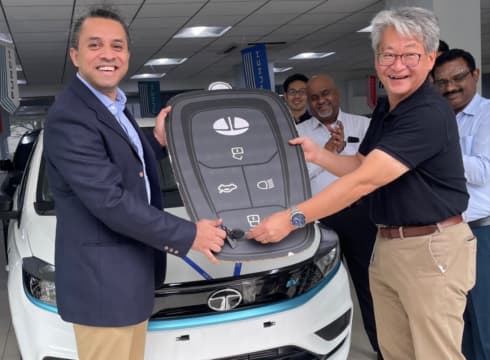This is Yamaha’s MBSI second investment in the shared mobility space after Royal Brothers, a bike rental startup
India’s electric vehicle (EV) market is estimated to emerge as a $7.09 Bn opportunity by 2025
Malbork intends to expand its services across many cities in India to build a safe, open, and revolutionary transportation ecosystem
Inc42 Daily Brief
Stay Ahead With Daily News & Analysis on India’s Tech & Startup Economy
Yamaha Motor’s Moto Business Service India (MBSI) has invested an undisclosed amount in B2C taxi aggregator startup Malbork Technologies to enter into the EV segment for four-wheelers.
With this deal, MBSI aims to increase the usage of vehicles on shared/rental platforms, create employment opportunities, contribute towards improving people’s quality of life, and maintain a clean and green environment in India, according to a statement.
“We are excited to officially kick start our operations in the EV sector with Malbork. India is seeing rapid growth in sales of EVs as travelers rush to switch from gasoline-powered vehicles due to rising cost of fuel. Additionally, there are key signs of momentum in this potential market of 1.4 Bn Indians,” said Shoji Shiraishi, MD, MBSI.
The company would onboard EVs across multiple cities and generate employment avenues for youth. MBSI plans to work with more mobility solutions companies and transform the overall shared mobility space in India with its financial and strategic experience gained from various stakeholders, added Shiraishi.
Founded in 2018 by N Sanjeev Kumar, Malbork is a Bengaluru-based electric sustainable energy powered taxi service. One of its products, Envi, is an environment-friendly EV and the only app-based B2C taxi aggregator service in the city.
“To make our cities a better place to live, we are creating a sustainable transportation model by deploying zero-emission electric cars and employing lower-income community members. In partnership with our EV manufacturers, fast charging partners, community of drivers and local government bodies, we are increasing the number of EVs on roads and creating social value,” said Sanjeev Kumar, CEO and founder, Malbork Technologies.
MBSI would procure EV in two, three and four wheelers categories. While two and three wheelers are deployed on delivery/rental platforms and four wheelers are deployed on taxi platforms such as Malbork, the statement said.
These vehicles are taken on rent by cab drivers, individuals and delivery executives at an affordable monthly lease value, which in turn ensures regular income and creates employment. MBSI will also explore the opportunities to work with last mile delivery platformers, especially with those keen on deploying EV in two, three and four wheelers categories.
MBSI is a mobility solution company that functions on asset management and service. It was launched in 2021 and its shareholders include Yamaha Motor Company, Japan and Yamaha Motor Biz Partner Company, Japan.
Meanwhile, Yamaha Motor operates global development, production and sales networks through 140 subsidiaries and equity-method affiliates in 30 countries and regions.
Yamaha’s Investments Via MBSI
Yamaha Motor also invested an undisclosed amount in bike rental company Royal Brothers via its Moto Business Service India (MBSI) subsidiary last month.
MBSI claims to assist with the acquisition of new two-wheelers and their deployment on rental platforms such as Royal Brothers on a revenue-sharing basis.
Royal Brothers was founded in 2015 by Kuldeep Purohit, Akash Suresh and Abhishek Chandrashekar. It has introduced riding gear rentals across the currently active cities and begun long-term leasing. It rents out two-wheelers ranging from mopeds to scooters to superbikes in over 20 cities throughout eight states.
India’s Electric Vehicle Market
India’s electric vehicle (EV) market is expected to grow at a compounded annual growth rate (CAGR) of 90% in this decade to touch $150 Bn by 2030, according to a report by consulting firm RBSA Advisors.
The Indian EV market is currently in its infancy and is estimated to grow at CAGR of 90% from 2021 to 2030. In terms of penetration, EV sales account for barely 1.3% of total vehicle sales in India during 20-21.
The report states that EV technology evolution in India requires sizable investment in R&D and product development, both on the automobile platforms and battery/charging technology. Collective investment done by 2W, 3W, 4W, EV component makers and last mile delivery companies was recorded at INR 25,000 Cr in 2021.
{{#name}}{{name}}{{/name}}{{^name}}-{{/name}}
{{#description}}{{description}}...{{/description}}{{^description}}-{{/description}}
Note: We at Inc42 take our ethics very seriously. More information about it can be found here.


